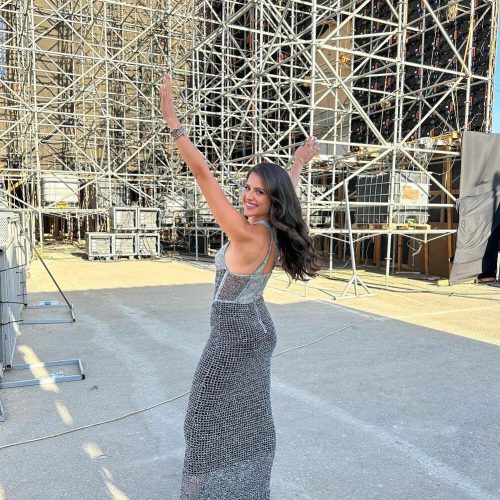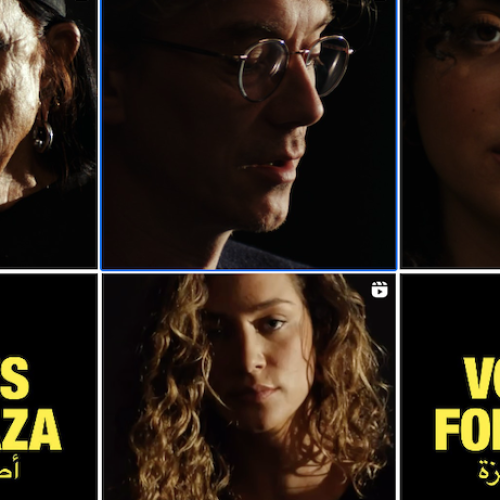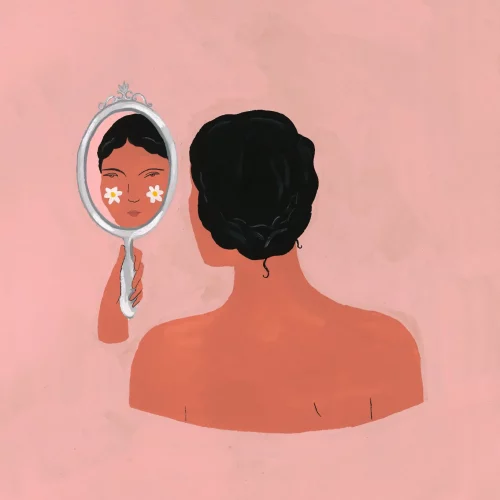On Nov. 18, 2023, hundreds of protesters gathered in front of JR Shinjuku Station in Tokyo to take part in an awareness-raising event dubbed “Tears For Palestine.” Standing before a white canvas while surrounded by a myriad of signs expressing solidarity with the people from the embattled parcel of land, 26-year-old Hanin Siam lowered her head, accompanied by fellow Palestinians of Japan (POF) co-founders Zac Mehdid, Aida Arafat, Mohammed Farajallah, Tatiana Alsukhon, and Hanae Takahashi; the collective behind the commemorative gathering.
Carrying brushes soaked in acrylic, demonstrators were asked to paint red tears to honor all of the blood shed since the distressing events of Oct. 7. Simultaneously, organizers began reading out loud the names of martyrs alongside select pieces of poetry, while participants laid flowers and listened to heartbreaking testimonies from those who have been silenced firsthand by Israeli colonial powers over the past seven decades and a half.
“It’s almost impossible to comprehend losing that number of people,” Siam told MILLE. “I hope that people will stop for a minute and commemorate those who are unjustly not with us anymore,” she added, hoping that her people will not simply be remembered as numbers.
“The whole concept is about paying homage to those who wanted to live, who loved life, who had dreams, and who didn’t get that chance. They are humans who want to have their basic human rights upheld just like anyone else. Unfortunately, Israel has taken that away from them,” she continued, shedding more light on the idea of painting red tears, which she credits Mehdid with.
Courtesy of David Lundin
Speaking on the first few steps that brought “Tears For Palestine” to life, Arafat described the founding members as “a group of friends” who united through “a shared desire for meaningful action.” Recalling the moment the idea of the initiative first rose, she detailed how the trio collectively “felt compelled to forge (their) own path and create a team dedicated to amplifying pro-Palestinian movements” in Japan.
Started by a group of Palestinians and Arabs living in Tokyo, ‘the initiative quickly grew from a handful of demonstrators to hundreds of people from several cities around the globe. According to the founders, the initiative finds strength in involving as many like-minded individuals as possible. “We wanted to create an alternative way of protesting,” Mehdid went on to reveal, emphasizing how proud he is that the movement managed to retain its initial “grassroots feel.” They are also regularly collaborate with many other satellite groups to bring their ethos to life, including Omou Palestine— a student and volunteer-led initiative that has been integral to spreading the word about Pro-Palestinian events in Tokyo— as well as No Detention Yes Life, an organization dedicated to raising awareness about a multitude of human rights and climate-related concerns.
Together, they launched a new movement following the distressing events of Oct.7, 2023, after which over 35,000 Palestinian men, women, and children have been killed as a direct result of systemic starvation, strategic bombing, and lack of access to adequate medical care. The organizers of POF, hand-in-hand with their close collaborators, incorporated art into their movement by juxtaposing the color red topped with the title of the initiative, and coupled with a hashtag (#tearsforpalestine) activists can share and refer back to from anywhere around the world.
Courtesy of David Lundin
“If you cook, cook a Palestinian dish. If you’re an artist, paint something that inspires discussion about Palestine. Ultimately, we’re just encouraging people to raise awareness in their own way,” Siam shared. “Online, users can be seen creating their own patches and prints, and expressing solidarity in all sorts of forms. This creativity spreads and only multiplies, and seeing how awareness can substantially increase on the internet is very fulfilling,” she added.
Since their first meeting in November, “Tears For Palestine” events have been held in over twenty cities across Japan, and have reached fairly remote locations such as Sapporo and Nagasaki. Some have even taken place beyond the borders of Japan. One of the group’s initial international events took place in Chiapas, Mexico, followed by Honolulu and San Francisco, and reached a pinnacle with a demonstration where their symbolic red-tinted canvas was laid in front of the White House fence during a protest in Washington D.C.
Although the event was met with widescale success around the world, Siam describes navigating a culture that often prioritizes conformity and harmony over dissent and public expression of grievances as one of the most difficult parts of protesting in Japan. “Getting people to understand, to care, and to show up is not easy in Japan,” she admitted, adding that demonstrations in the United States and Europe are more likely to see thousands of attendees as a result of greater familiarity with activism and a more robust culture of public protest.
Courtesy of David Lundin
Claiming that people in Japan are usually “disassociated from global issues,” Siam is hopeful that once people are made aware of the well-documented atrocities Israel has committed against Palestinians, reactions may switch and many will develop a growing desire to take action. “Once they know and understand, they care so much and they are so passionate. They give it their all, which is so special and beautiful to see from a peaceful country like Japan,” Siam explained.
A noteworthy display of solidarity was seen this February after Japanese aircraft supplier Itochu decided to sever ties with the Israeli defense contractor Elbit Systems on the grounds of “preventing acts of genocide.” Preceded by demonstrations held in front of Itochu Group’s headquarters in Tokyo, which were led by Natsuki Geijima, the socially-conscious move underscored the impact of grassroots activism in influencing corporate policy and promoting ethical business practices aligned with humanitarian principles. “It felt like such a win for us,” Siam fondly recalled adding, “Regular working people don’t want to be tied to a genocide, and getting these corporations’ attention only felt like it added wind under our wings. It keeps our motivation high and ignites even bigger fires in our hearts.”












